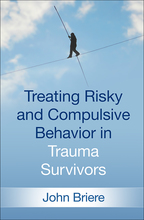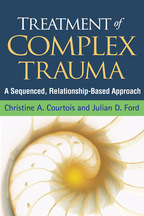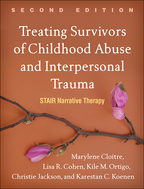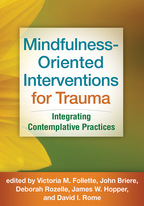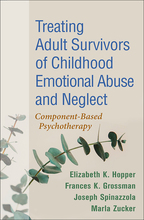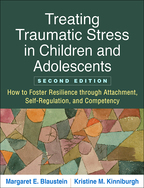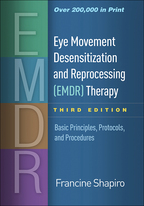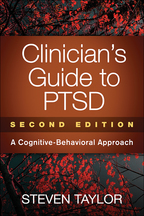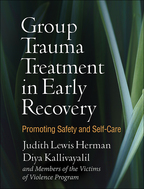Treating Risky and Compulsive Behavior in Trauma Survivors
John Briere
Hardcovere-bookprint + e-book
Hardcover
orderApril 19, 2019
ISBN 9781462538683
Price: $45.00 230 Pages
Size: 6" x 9"
Sign up for emails on upcoming titles on Trauma & PTSD (with special discounts)!
The reproducible materials can be downloaded and printed in PDF format.
The reproducible materials can be downloaded and printed in PDF format.
“This brilliant book offers a 'reactive avoidance' model for understanding risky behaviors that enables more clinical efficacy, not just for modulating behaviors, but also for healing underlying trauma and attachment difficulties. Drawing on his deep clinical expertise, Briere brings a fresh, skillful integration of acceptance and mindfulness into his approach, and creates a trajectory toward full wellness. This book is truly a contribution to the field. Highly recommended!”

—Tara Brach, PhD, author of Radical Acceptance and True Refuge
“Briere brings his deep compassion and soaring intellect to a set of timely issues that counselors often struggle with: how to address risky and compulsive behavior in traumatized clients. He deftly integrates his decades of experience as an academic, clinician, and writer to bring forth a work that is sure to stimulate important discussion of topics such as self-harm, behavioral addictions, dissociation, the role of self-protective avoidance, and how treatment can become more sensitive to the complex interplay between these. He offers vivid case examples that evoke the emotional yearning underlying the intense push–pull dynamics of risky behaviors. Bravo for raising these essential topics and for providing a work that will be highly relevant to all levels of counselor education.”

—Lisa M. Najavits, PhD, Director, Treatment Innovations; Adjunct Professor of Psychiatry, University of Massachusetts Medical School
“This book presents a theory-driven, powerfully patient-centered approach. Multiple case examples demonstrate the complexity of risky and compulsive behaviors in trauma survivors. Working across diagnostic categories, Briere consistently brings home the message that a range of seemingly disparate problems are efforts to adapt and resolve trauma-generated emotional pain and stress. This framing allows the clinician to obtain greater clarity about and compassion for these clients. The evidence-based interventions are presented in detail and with a sound rationale, both of which are essential for effective implementation.”

—Marylene Cloitre, PhD, Associate Director of Research, National Center for PTSD Dissemination and Training Division; Department of Psychiatry and Behavioral Sciences, Stanford University
“After 30 years in practice, it is not often that reading a single book clarifies my thinking and is likely to improve my therapy—but I can say that about this book. This is a magnificent work by a masterful clinician. Briere is ingenious in his clinical demonstrations, clear in his description of underlying mechanisms, and thoughtful in his application of empirically based therapies. This is a book that can be handed from the most experienced therapist to the beginner, and back again, with both finding material that will benefit them.”

—Constance Dalenberg, PhD, Distinguished Professor, California School of Professional Psychology at Alliant National University
“An invaluable addition to the literature on the treatment of trauma and attachment disturbances, written by one of the most prominent experts in the field. Briere brings together a wealth of clinical and research experience in this integrated therapy that emphasizes emotion regulation, carefully titrated exposures, mindfulness, and metacognitive awareness. He describes specific techniques and provides resources that will become essential tools for all therapists working with clients with complex trauma and high-risk behaviors. This is the trauma book we have all been waiting for.”

—Marsha Runtz, PhD, Department of Psychology, University of Victoria, British Columbia, Canada
—Tara Brach, PhD, author of Radical Acceptance and True Refuge
“Briere brings his deep compassion and soaring intellect to a set of timely issues that counselors often struggle with: how to address risky and compulsive behavior in traumatized clients. He deftly integrates his decades of experience as an academic, clinician, and writer to bring forth a work that is sure to stimulate important discussion of topics such as self-harm, behavioral addictions, dissociation, the role of self-protective avoidance, and how treatment can become more sensitive to the complex interplay between these. He offers vivid case examples that evoke the emotional yearning underlying the intense push–pull dynamics of risky behaviors. Bravo for raising these essential topics and for providing a work that will be highly relevant to all levels of counselor education.”
—Lisa M. Najavits, PhD, Director, Treatment Innovations; Adjunct Professor of Psychiatry, University of Massachusetts Medical School
“This book presents a theory-driven, powerfully patient-centered approach. Multiple case examples demonstrate the complexity of risky and compulsive behaviors in trauma survivors. Working across diagnostic categories, Briere consistently brings home the message that a range of seemingly disparate problems are efforts to adapt and resolve trauma-generated emotional pain and stress. This framing allows the clinician to obtain greater clarity about and compassion for these clients. The evidence-based interventions are presented in detail and with a sound rationale, both of which are essential for effective implementation.”
—Marylene Cloitre, PhD, Associate Director of Research, National Center for PTSD Dissemination and Training Division; Department of Psychiatry and Behavioral Sciences, Stanford University
“After 30 years in practice, it is not often that reading a single book clarifies my thinking and is likely to improve my therapy—but I can say that about this book. This is a magnificent work by a masterful clinician. Briere is ingenious in his clinical demonstrations, clear in his description of underlying mechanisms, and thoughtful in his application of empirically based therapies. This is a book that can be handed from the most experienced therapist to the beginner, and back again, with both finding material that will benefit them.”
—Constance Dalenberg, PhD, Distinguished Professor, California School of Professional Psychology at Alliant National University
“An invaluable addition to the literature on the treatment of trauma and attachment disturbances, written by one of the most prominent experts in the field. Briere brings together a wealth of clinical and research experience in this integrated therapy that emphasizes emotion regulation, carefully titrated exposures, mindfulness, and metacognitive awareness. He describes specific techniques and provides resources that will become essential tools for all therapists working with clients with complex trauma and high-risk behaviors. This is the trauma book we have all been waiting for.”
—Marsha Runtz, PhD, Department of Psychology, University of Victoria, British Columbia, Canada

